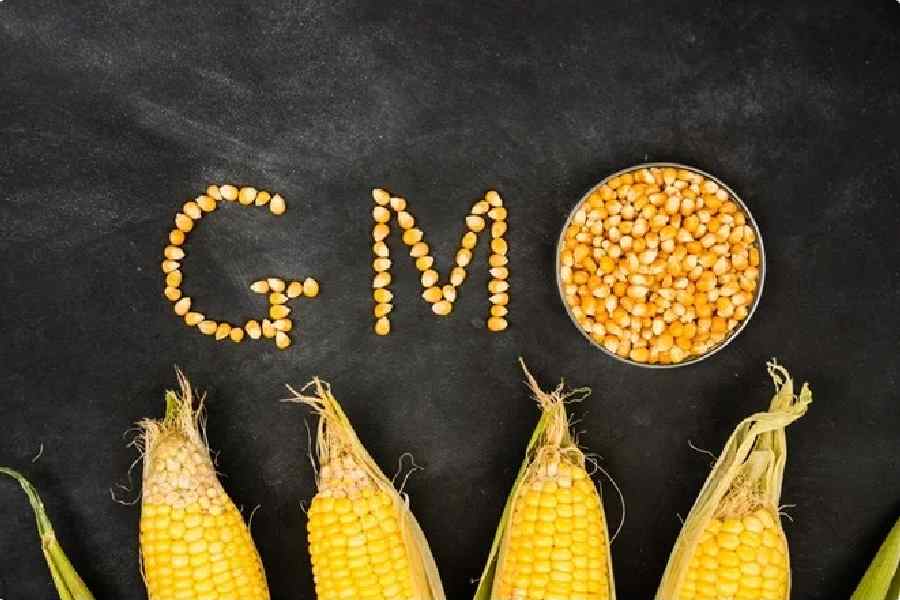Making a strong case for growing genetically modified (GM) crops for enhanced food security, the Centre told the Supreme Court on Thursday that India is already importing huge quantities of edible oil extracted from genetically altered oilseeds for domestic consumption and "unfounded fears" of their adverse impact is hurting farmers, consumers and industry.
Solicitor General Tushar Mehta, appearing for the Centre, told the court that approximately 55-60 per cent of edible oil consumed in India is imported.
"Strengthening of plant breeding programmes including the use of new genetic technologies such as genetically engineered technology is critical for meeting emerging challenges in Indian agriculture and ensuring food security while reducing foreign dependency," Mehta told a bench of Justices B V Nagarathna and Sanjay Karol.
The law officer told the court the total edible oil demand in India in 2020-21 was 24.6 million tonnes while domestic availability stood at 11.1 million tonnes.
"In 2020-21, 13.45 million tonnes (54 per cent) of our total edible oil demand was met through import worth about Rs 1,15,000 crore, which includes palm oil (57 per cent of total oil import), soybean oil (22 per cent), sunflower oil (15 per cent) and a small quantity of canola quality mustard oil. In 2022-23, 155.33 lakh tonnes (55.76 per cent) of our total edible oil demand was met through import," Mehta said.
The solicitor general said India is importing and consuming large quantities of edible oil extracted from GM oilseeds.
"India imports about 55,000 million tonnes of canola oil largely from GM canola seeds. Similarly, nearly 2.8 lakh tonnes of soybean oil is being imported annually, largely comprising GM soybean oil. Most exporting countries like Argentina, the US, Brazil and Canada cultivate GM soybean. Globally, around 80 per cent of soybean growing is GM soybean.
"As India is importing and consuming oil derived from GM crops, opposition to such technology based on such unfounded fears of adverse impact is only hurting farmers, consumers and industry," he asserted.
Mehta submitted three genes- barnase, barstar, and bar- which are used for developing mustard hybrid DMH-11 have a history of more than 20 years of safely being there in the food chain.
Observing that the issue of genetically modified crops is very technical and scientific, the top court had said on Wednesday it will decide the plea against the environmental release of GM mustard keeping in mind what is good for the country.
The apex court had earlier questioned the Centre about why reports of the court-appointed Technical Experts Committee (TEC) on biosafety of genetically modified (GM) crops were not looked into by the Genetic Engineering Appraisal Committee (GEAC).
It asked Attorney General R Venkataramani, appearing for the Centre, whether the GEAC or a sub-committee of experts ever considered the reports filed by TEC before the October 25, 2022 decision to approve the environmental release of transgenic mustard hybrid DMH-11.
The attorney general had said being a statutory body, the GEAC is not supposed to go into these reports but has considered every relevant scientific finding before giving the go-ahead for the environmental release.
The top court is hearing separate pleas by activist Aruna Rodrigues and NGO 'Gene Campaign' seeking a moratorium on the release of any genetically modified organisms (GMOs) into the environment pending a comprehensive, transparent and rigorous biosafety protocol in the public domain conducted by independent expert bodies.
The Centre, on the other hand, is seeking withdrawal of an oral undertaking given in November 2022 by its law officer about not pressing ahead with commercial cultivation of genetically modified (GM) mustard.
On August 29, 2023, the top court had observed that environmental harm cannot be undone after the Centre said either it be discharged from the oral undertaking of November 2022 or, alternatively, the government be permitted to sow GM seeds this season at some sites.
On November 3, 2022, the top court had ordered status quo on the GEAC's decision to approve GM mustard for commercial cultivation.
The top court had earlier said it was more concerned about the risk factors than anything else when it came to conditional approval granted by the Centre for environmental release of GM mustard.
At a meeting on October 18, 2022, the GEAC, the country's regulator for genetically modified organisms, recommended the environmental release of mustard hybrid DMH-11 for seed production and testing "as per the existing ICAR guidelines and other extant rules/regulations before commercial release".
Transgenic mustard hybrid DMH-11 has been developed by the Centre for Genetic Manipulation of Crop Plants (CGMCP) at Delhi University.
The government has so far approved only one GM crop- Bt cotton- for commercial cultivation in 2002.
Except for the headline, this story has not been edited by The Telegraph Online staff and has been published from a syndicated feed.










